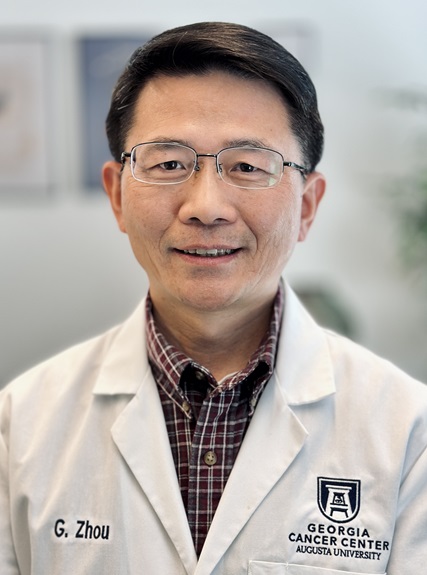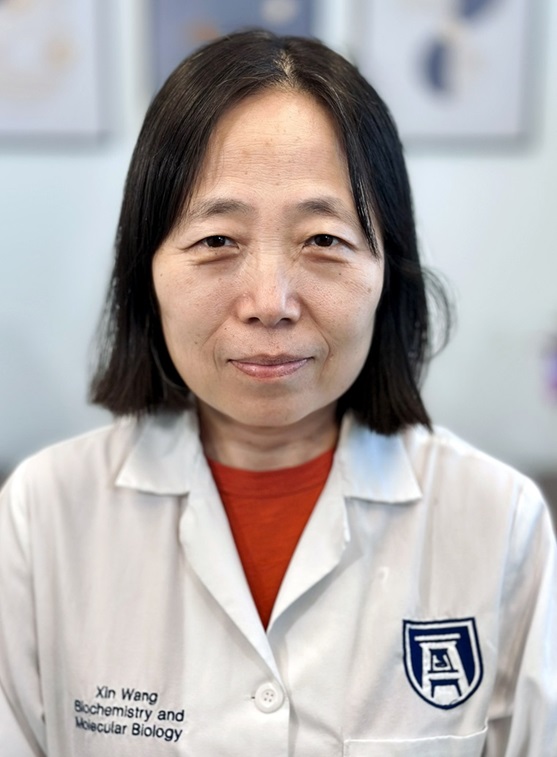Georgia Cancer Center
We are Georgia's Cancer Center
The Zhou Lab

Gang Zhou, PhD
Leader, Cancer Immunology, Inflammation, & Tolerance Program
Professor, Georgia Cancer Center, Medicine, MCG
Professor, Biochemistry & Molecular Biology, MCG
Professor, The Graduate School, Augusta University
Contact Us
The Gang Zhou Lab
Health Sciences Campus
GCC - M. Bert Storey Research Building
1410 Laney Walker Blvd., CN-4144A1
(706) 721-4472
Research Summary
The Zhou Laboratory studies how chemotherapeutic agents modulate the tumor microenvironment (TME) and how their immunomodulatory effects can be exploited to facilitate cancer immunotherapy. The research focus of the lab is to understand how intrinsic and extrinsic factors shape the functional status of tumor-reactive CD4+ T cells in the post-chemotherapy setting. Studies from Dr. Zhou’s group have revealed critical mechanisms governing the generation of polyfunctional CD4+ T cells, chemotherapy-induced immunosuppressive myeloid cells, and T cell-driven alteration of tumor metabolism. These findings may aid in the development of more efficacious cancer immunotherapy.
Research Interests
Molecular mechanisms underlying T cell polyfunctionality
Adoptive cell therapy (ACT) using engineered or naturally occurring tumor-specific T cells has emerged as a promising approach for cancer treatment. Despite notable successes, the potential of ACT to achieve durable and curative outcomes has not been fully realized in many cases. Major barriers include insufficient T cell expansion, persistence, tumor infiltration, and the loss of effector function due to T cell exhaustion. There is a growing need for novel strategies to overcome these limitations and enhance ACT efficacy. The presence of polyfunctional CD4 T cells, defined by their ability to simultaneously produce multiple pro-inflammatory cytokines, has been correlated with improved therapeutic outcomes in both preclinical models and clinical studies. However, how to generate polyfunctional CD4 T cells suitable for ACT remains elusive. Our previous work demonstrated that CD4 T cells exposed to interleukin-7 (IL-7) during antigenic stimulation acquire a polyfunctional phenotype through a STAT5-dependent mechanism. Our recent work showed that ectopic expression of a constitutively active form of STAT5 (CASTAT5) in tumor-specific CD4 T cells induces broad transcriptional and epigenetic reprogramming. This remodeling confers polyfunctionality, resistance to exhaustion, and enhanced tumor-infiltrating capacity. Notably, CASTAT5 expression significantly improves the expansion and persistence of CD19-directed CAR T cells, leading to high cure rates in murine models of advanced lymphoma. Our ongoing studies aim to elucidate the molecular and cellular mechanisms by which sustained STAT5 signaling promotes and maintains T cell polyfunctionality. We are employing an integrated multi-omics approach, including transcriptomics, epigenomics, metabolomics, and CRISPR-based gene-editing, to uncover the regulatory networks driving this desirable T cell state. These insights will inform the rational design of next-generation ACT strategies with improved potency and durability.
Chemotherapy-induced immunosuppressive myeloid cells & antitumor immunity
Tumor recurrence remains a significant clinical challenge in cancer treatment. With the rise of immune-based therapies, there is increasing interest in combining immunotherapy with conventional chemotherapy to achieve more durable antitumor responses. However, emerging evidence suggests that chemotherapy can paradoxically promote immune evasion in certain contexts. Our studies have shown that several standard-of-care chemotherapeutic agents, including cyclophosphamide, melphalan, and doxorubicin, can induce the expansion of a subset of neutrophil-like monocytes during chemotherapy-driven myelopoiesis. These therapy-induced monocytes acquire immunosuppressive activity with the capacity to inhibit T cell activation. Selective depletion of these monocytes following chemo-immunotherapy significantly improved long-term survival in preclinical models, indicating their active role in dampening antitumor immunity. These findings underscore the Janus-faced nature of chemotherapy’s immunomodulatory effects: while it can enhance tumor immunogenic cell death and immune activation, it may also generate suppressive myeloid populations that blunt immune responses. Targeting therapy-induced myeloid cells therefore represents a promising strategy to shift this balance in favor of effective, long-lasting antitumor immunity and to maximize the therapeutic potential of chemo-immunotherapy combinations.
Exploiting existing and novel NSAIDs for cancer immunotherapy
Many non-steroidal anti-inflammatory drugs (NSAIDs), such as sulindac, indomethacin and celecoxib, have demonstrated immunopotentiating effects largely through inhibition of cyclooxygenase (COX) enzymes. However, chronic COX inhibition is associated with significant toxicities in vital organs, limiting the long-term clinical utility of conventional NSAIDs in oncology. This project aims to understand the immunopotentiating activities of NSAIDs that are independent of COX inhibition, and develop novel non-COX-inhibitory NSAIDs to enhance the efficacy of cancer immunotherapies. Our recent findings reveal that indomethacin, a prototypical NSAID commonly used for pain relief, can sensitize tumor cells to adoptive cell therapy by inducing oxidative stress and activating the death receptor 5 (DR5)–TRAIL apoptotic pathway. Our ongoing studies are focused on characterizing the immunomodulatory effects of a novel compound with dual inhibitory activity against RAS and β-catenin signaling, two pathways critically involved in cancer cell survival and immune suppression. These efforts may lead to the development of next-generation NSAID derivatives with potent antitumor and immunostimulatory properties, offering a cost-effective strategy to augment current cancer immunotherapies while minimizing systemic toxicity.
Selected Publications
Michy P. Kelly , Viacheslav O. Nikolaev , Leila Gobejishvili , Claire Lugnier, Christian Hesslinger , Peter Nickolaus , David A. Kass , Walma Pereira De Vasconcelos, Rodolphe Fischmeister , Stefan Brocke , Paul M. Epstein , Gary A. Piazza, Adam B. Keeton, Gang Zhou, Mohammad Abdel-Halim, Ashraf H. Abadi, George S. Baillie, Mark Giembycz, Graeme Bolger, Gretchen Snyder, Kjetil Tasken, Nathaniel E.B. Saidu, Martina Schmidt, Manuela Zaccolo, Ralph T. Schermuly, Hengming Ke, Rick H. Cote, Soroush Mohammadi Jouabadi, Anton J.M. Roks. Cyclic nucleotide phosphodiesterases as drug targets. Pharmacological Reviews. 2025. https://doi.org/10.1016/j.pharmr.2025 100042
Yang W, Feng Z, Lai X, Li J, Cao Z, Jiang F, Chen F, Zhan S, Kong F, Yang L, Teng Y, Watford WT, Zhou G*, Xie J*. Calcium nanoparticles target and activate T cells to enhance anti-tumor function. Nat Commun. 2024 Nov 21;15(1):10095. doi: 10.1038/s41467-024-54402-y. PMID: 39572569; PMCID: PMC11582315.
Zhi-chun Ding, George I. Zhou, Ogacheko D. Okoko, Xin Wang, Locke J. Bryan, Gang Zhou*, Huidong Shi*. Single-cell transcriptome profiling of the myeloid cells repopulating after chemotherapy identifies a neutrophil-like monocyte subset with pro-tumor activities. bioRxiv 2024.12.28.630613; doi: https://doi.org/10.1101/2024.12.28.630613.
Foote JB, Mattox TE, Keeton AB, Chen X, Smith FT, Berry K, Holmes TW, Wang J, Huang CH, Ward A, Mitra AK, Ramirez-Alcantara V, Hardy C, Fleten KG, Flatmark K, Yoon KJ, Sarvesh S, Nagaraju GP, Bandi DSR, Maxuitenko YY, Valiyaveettil J, Carstens JL, Buchsbaum DJ, Yang J, Zhou G, Nurmemmedov E, Babic I, Gaponeko V, Abdelkarim H, Boyd MR, Gorman G, Manne U, Bae S, El-Rayes BF, Piazza GA. A Pan-RAS Inhibitor with a Unique Mechanism of Action Blocks Tumor Growth and Induces Antitumor Immunity in Gastrointestinal Cancer. Cancer Res. 2024 Dec 19. doi: 10.1158/0008-5472.CAN-24-0323. Epub ahead of print. PMID: 39700396.
Sigler S, Abdel-Halim M, Fathalla RK, Da Silva LM, Keeton AB, Maxuitenko YY, Berry K, Zhou G, Engel M, Abadi AH, Piazza GA. Novel Celecoxib Derivative, RF26, Blocks Colon Cancer Cell Growth by Inhibiting PDE5, Activating cGMP/PKG Signaling, and Suppressing β-catenin-dependent Transcription. Anticancer Agents Med Chem. 2024 Sep 2. doi: 10.2174/0118715206318802240821114353. Epub ahead of print. PMID: 39225209.
John D. Klement, Priscilla S. Redd, Chunwan Lu, Alyssa D. Merting, Dakota B. Poschel, Dafeng Yang, Natasha M. Savage, Gang Zhou, David H. Munn, Padraic G. Fallon, Kebin Liu. Tumor PD-L1 engages myeloid PD-1 to suppress type I interferon to impair cytotoxic T lymphocyte recruitment. Cancer Cell. 2023. Volume 41, Issue 3. Pages 620-636. https://doi.org/10.1016/j.ccell.2023.02.005.
Nada S. Aboelella, Caitlin Brandle, Ogacheko Okoko, MD Yeashin Gazi, Zhi-Chun Ding, Hongyan Xu, Gregory Gorman, Roni Bollag, Marco L. Davila, Locke Bryan, David H. Munn, Gary A. Piazza and Gang Zhou*. Indomethacin-induced oxidative stress enhances death receptor 5 signaling and sensitizes tumor cells to adoptive T-cell therapy. The Journal for ImmunoTherapy of Cancer. 2022 Jul;10(7):e004938. doi: 10.1136/jitc-2022-004938. PMID: 35882449; PMCID: PMC9330341.
Research Team

Xin Wang
- Research Associate
Reduce the Burden
The Georgia Cancer Center at Augusta University is dedicated to reducing the burden of cancer in Georgia and across the globe through superior care, innovation, and education. Through unprecedented expansion, the Georgia Cancer Center is providing access to more first-in-the-nation clinical trials, world-renowned experts and life-saving options.
Follow the Georgia Cancer Center